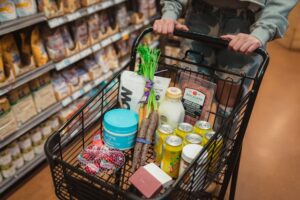Shoppers expect to spend 8% more on groceries this summer than a year ago, survey finds
The majority of people who took part in a recent KPMG poll said they think tariffs will push up grocery prices — a higher percentage than for any other category of goods.

- Shoppers anticipate spending 8% more on groceries this summer than they did during the same period last year, according to survey data released last week by consulting firm KPMG.
- Nearly 70% of respondents to the poll said they expect grocery prices to rise because of tariffs — a higher percentage than for any other category of goods.
- Consumers’ preferences for where they buy groceries remained mostly unchanged compared with 2024 even as they continue to deal with concerns over inflation and their personal financial circumstances.
KPMG’s findings make clear that shoppers are bracing for rough economic conditions as 2025 wears on.
Seventy-one percent of the 1,516 participants in the firm’s latest consumer pulse survey, which was conducted from March 12-20, said they expect the economy to tip into a recession during the next year, and 60% have started watching their spending more carefully. More than 90% said their living costs are higher now than they were in 2024.
Twenty-seven percent of respondents said they expect to buy more groceries this summer than they did during the same period in 2024, while 60% expect that figure to remain unchanged.
In a sign of the stress people are feeling as they look to manage their costs, 69% said they are eating at home more often instead of at restaurants. In addition, more than a third said they’ve cut back on food or struggled to come up with money to pay for groceries.
That cautious sentiment is showing up in how people view the grocery landscape. The majority of participants in the research who believe their grocery bills will be higher over the coming months (70%) attributed that conclusion to higher prices. More than a quarter (28%) said they expect to spend more on groceries because they’re eating out less.
About a quarter of participants said they prefer to shop for groceries at mass retailers, while 20% pointed to national and regional grocery stores as their top choice and 14% said they gravitate to local grocery stores.
The findings also show that breakfast is the meal people are most likely to prepare at home, followed by dinner and lunch.
Shoppers also indicated that they are trying to improve their well-being, with about half (49%) of respondents saying they’ve changed their focus on health to a moderate or substantial extent. In addition, over a third (36%) indicated that they’ve decided to eat at home more often to gain more control over the food they consume.
Related news
Coca-Cola To Discontinue Frozen Products In US And Canada
🎧 Hallgasd a cikket: Lejátszás Szünet Folytatás Leállítás Nyelv: Auto…
Read more >Power in craft beer
🎧 Hallgasd a cikket: Lejátszás Szünet Folytatás Leállítás Nyelv: Auto…
Read more >Related news
It isn’t about Rossmann this time
🎧 Hallgasd a cikket: Lejátszás Szünet Folytatás Leállítás Nyelv: Auto…
Read more >II. Green Gastronomy – Marketing Communication Workshop organized by the MMSZ HoReCa and Green Section
🎧 Hallgasd a cikket: Lejátszás Szünet Folytatás Leállítás Nyelv: Auto…
Read more >









